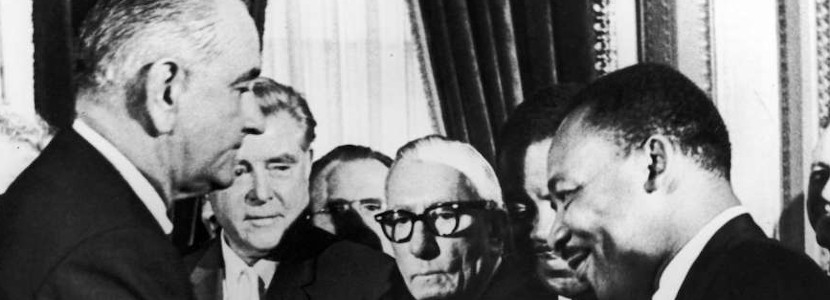
Voting Rights Act Expands Voter Registration (1965)
THE COURTS' ROLE IN PROTECTING VOTING RIGHTS - Read More.....
The Voting Rights Act, adopted initially in 1965 and extended in 1970, 1975, and 1982, is generally considered the most successful piece of civil rights legislation ever adopted by the United States Congress. The Act codifies and effectuates the 15th Amendment's permanent guarantee that, throughout the nation, no person shall be denied the right to vote on account of race or color. In addition, the Act contains several special provisions that impose even more stringent requirements in certain jurisdictions throughout the country.
Despite the ratification of the Fifteenth Amendment, state officials in a number of states resisted expansion of the franchise to African Americans. Congress determined that the existing federal anti-discrimination laws were not sufficient to overcome this resistance. Committee hearings showed that the Department of Justice's efforts to eliminate discriminatory election practices by litigation on a case-by-case basis had been unsuccessful in opening up the registration process; as soon as one discriminatory practice or procedure was proven to be unconstitutional and enjoined, a new one would be substituted in its place and litigation would have to commence anew.
President Johnson signed the resulting legislation into law on August 6, 1965. The act contains numerous provisions that regulate elections. The act's "general provisions" provide nationwide protections for voting rights. Section 2 is a general provision that prohibits every state and local government from imposing any voting law that results in discrimination against racial or language minorities. Other general provisions specifically outlaw literacy tests and similar devices that were historically used to disenfranchise racial minorities.
The act also contains "special provisions" that apply to only certain jurisdictions. A core special provision is the Section 5 preclearance requirement, which prohibits certain jurisdictions from implementing any change affecting voting without receiving preapproval from the U.S. attorney general or the federal courts that the change does not discriminate against protected minorities. Another special provision requires jurisdictions containing significant language minority populations to provide bilingual ballots and other election materials.
The Voting Rights Act immediately decreased racial discrimination in voting. The suspension of literacy tests and the assignments of federal examiners and observers allowed for high numbers of racial minorities to register to vote. In covered jurisdictions, less than one-third of the African American population was registered in 1965; by 1967, this number increased to more than half. In nine of the 13 Southern states, a majority of African American residents became registered to vote. The act successfully and massively increased voter turnout and voter registration, in particular among Blacks.
